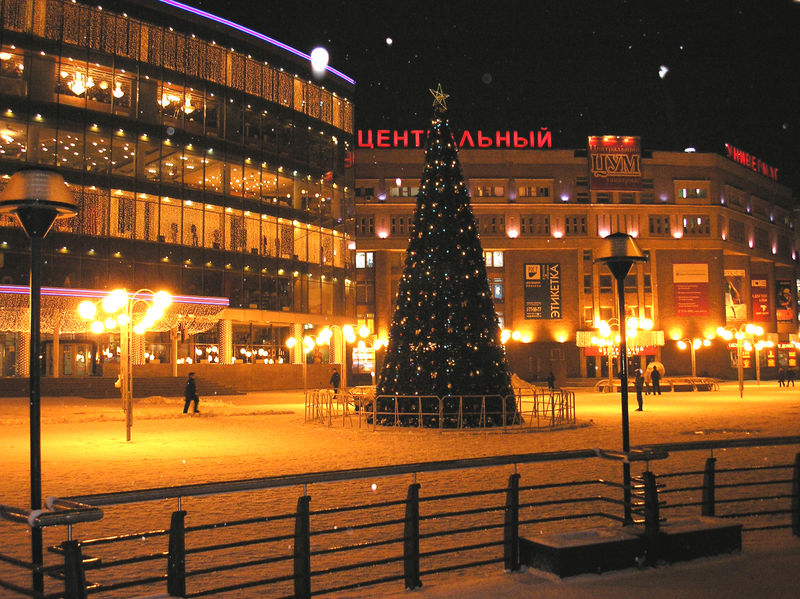What’s the deal with the Russian New Year Tree?
Nonna and Tzipporah asked in the comments to yesterday’s post what the significance of the Russian New Year tree was to me. I explain the concept of Russian New Year every year, so maybe if I explain it well enough in this blog post, I can just get a tattoo of the permalink and flash it to people at New Year parties. That should really get the blog traffic going. Also, people will think I’m insane.
The New Year tree, the Ёлка (yolka) is the Russian equivalent of the Christmas tree. However, since Russians weren’t allowed to celebrate Christmas for 80+ years because atheism was the state-mandated religion, t[<div id="attachment_1732" style="width: 522px" class="wp-caption aligncenter">

Yolka in Nizhniy Novgorod, my birthplace Source: Wikipedia user Setaries
</div>
Nonna and Tzipporah asked in the comments to yesterday’s post what the significance of the Russian New Year tree was to me. I explain the concept of Russian New Year every year, so maybe if I explain it well enough in this blog post, I can just get a tattoo of the permalink and flash it to people at New Year parties. That should really get the blog traffic going. Also, people will think I’m insane.
The New Year tree, the Ёлка (yolka) is the Russian equivalent of the Christmas tree. However, since Russians weren’t allowed to celebrate Christmas for 80+ years because atheism was the state-mandated religion, t](http://en.wikipedia.org/wiki/New_Year_tree) as a proxy for the celebrations. So New Year’s became the biggest holiday in Soviet culture and it continues to be in Russian culture until this day even though Russian Orthodoxy continues to make a comeback.
New Year is very important in Russian culture, both for Russians and Jews that now have taken to celebrating Hannukah alike, much more so than the rah-rah- party favor blowing champagne drinking commercialized routine it is in the West. It’s a time when anything is possible, when all the wishes you make can come true, and when you can truly, truly start over. It is a time when many Russian fairy tales take place and when magic abounds in the snow-covered pine woods and the Nutcracker comes out of his casing.
It’s wrapped up in the mystique of the Russian snow-the endless snow that everyone waits for to cover the ugly muck, the magical underbelly that softens the harsh Russia. I don’t long for it as much as my parents do. Every time their friends come back from Canada, they ask, “Is there a real Russian winter there? Is there snow,” with immense longing to walk among the white branches and hear the soft crunching under their feet that they remember from their childhood. But sometimes in the East Coast rains, I long for it, too, for a winter I don’t remember much except being bundled in layer after layer so I could go outside, and for the lights of the decorations on our yelka.
So the New Year tree and the New Year are always associated with thick down, so much so, that there are dozens of songs about snow, of which the first is my favorite. It’s about how the new snow is eliminating all traces of everything the singer had before his relationship with the woman he’s singing to.
Here’s a song about snow made of the words of a poem by Boris Pasternak:
New Year is also associated with parties, with special ornaments for the tree, and with Ded Moroz and Snegurochka, and is the bright spot in many Russian winter holidays. Every New Year that we’ve spent has been bright and cheery, much like Hannukah, but different, with lights and friends and parties lasting until 5 am, long past the last Dick Clark special. There are many Russian and Soviet movies about the New Year and winter, with a particular favorite being Morozko of which this is the part about how Ded Moroz, Father Frost, creates winter in Russia:
My dad especially loves New Year and the bright toys that go on the yolka, and every year he decorates ours with loving care.
I suppose it is because of the warmth that New Year brings to me, that it always brought me before I even knew what a menorah was, that it will always be my favorite holiday, and that the yolka doesn’t signify Christmas to me, but something much more rooted in Russian tradition and the past. It’s something that I associate more with my non-Jewish dad than any other holiday, as well, which is why this year , my first with my own yolka I will take extra care to hang up all of the toys and colored balls and wrap my yolochka with tinsel.
Our little yolkochka already has had an effect. I was putting it up on Friday when I was off from work and Mr. B was not. When he saw it sitting there with the ornaments that I’ve carefully collected nearby, his face lit up, also remembering the Soviet New Years of his childhood and he said, “Oh, the yolka is out already?” and our apartment felt more like a home than ever.